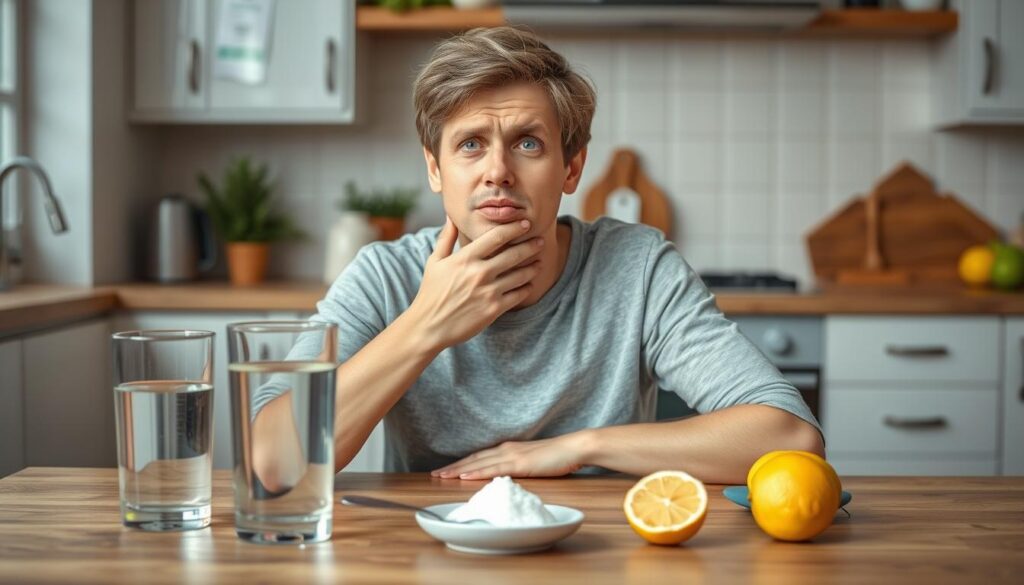Hiccups can disrupt your day unexpectedly. Most cases resolve within minutes1. Charles Osborne holds the Guinness World Record for hiccupping continuously for 68 years1.
Common triggers include eating too fast, drinking fizzy beverages, or stress. These diaphragm contractions are usually brief and harmless. Hiccups lasting over 48 hours are considered chronic1.
Quick, effective remedies can stop hiccups. Simple techniques interrupt muscle spasms and bring relief. Knowing the right strategies makes a big difference.
Key Takeaways
- Hiccups are usually harmless and resolve within minutes
- Multiple home remedies can help stop hiccups quickly
- Persistent hiccups might indicate underlying health conditions
- Stress and eating habits can trigger hiccups
- Most hiccup episodes are brief and non-threatening
Understanding Hiccups: What Causes Them?
Hiccups are more than just a minor annoyance. They’re a complex bodily response with fascinating mechanisms. These involuntary diaphragm contractions can happen to anyone, creating that distinctive “hic” sound.
The Science Behind Hiccups
Your diaphragm is key in hiccup formation. When it contracts involuntarily, it causes a quick breath intake. This gets interrupted by vocal cord closure, resulting in the hiccup sound2.
Hiccups can occur rapidly. They range from four to 60 times per minute2.
Common Triggers for Hiccup Causes
- Eating or drinking too quickly
- Consuming carbonated beverages
- Sudden emotional excitement
- Temperature changes in the stomach
- Excessive alcohol consumption
Some specific hiccup causes include certain medications. Antibiotics and anxiety drugs can trigger hiccups3. Males are more likely to develop long-term hiccups4.
When to Seek Medical Attention
Most hiccups are harmless. But persistent hiccups lasting over 48 hours could signal an underlying condition. About 4,000 Americans are hospitalized yearly due to hiccups2.
Chronic hiccups might be linked to:
- Central nervous system disorders
- Metabolic conditions like diabetes
- Kidney problems
- Gastroesophageal reflux disease (GERD)
If your hiccups interfere with eating, sleeping, or speaking, it’s time to consult a healthcare professional.
About 80% of persistent hiccup cases are associated with GERD2. Don’t ignore recurring hiccups that impact your daily life.
Effective Home Remedies to Stop Hiccups
Hiccup treatments can be surprisingly simple and effective. Everyone gets hiccups sometimes. Knowing how to stop them quickly can save you from embarrassment and discomfort5.
You don’t always need medical help for hiccups. Many hiccup cures are in your kitchen or use simple breathing tricks.
Drinking Techniques for Hiccup Relief
- Sip ice-cold water slowly to shock your system6
- Try drinking from the opposite side of the glass to change your breathing pattern6
- Gargle with ice-cold water to interrupt the hiccup cycle6
Sweet Solutions for Stopping Hiccups
Some surprising hiccup cures involve sweet ingredients. Sugar and honey can be powerful allies in stopping hiccups:
Cooling Techniques to Interrupt Hiccups
Cooling down can be an effective strategy for hiccup relief:
- Suck on ice cubes to stimulate nerves6
- Eat a small amount of ice cream
- Use ice to reset your diaphragm’s rhythm6
“The best hiccup treatments are often the simplest ones you can do at home.”
Most hiccups are harmless and last only a few minutes5. If your hiccups persist or become chronic, talk to a doctor.
Lifestyle Tips for Preventing Hiccups
Understanding your body’s triggers is key to preventing hiccups. Your daily habits play a crucial role in hiccup prevention. By making smart changes, you can reduce frequent hiccup episodes.
Smart Eating Habits
Your eating habits are vital for hiccup prevention. Choose smaller, more frequent meals and eat slowly. This helps minimize air swallowing.
Avoid large meals before bed and stay away from carbonated drinks and alcohol. These can trigger diaphragm contractions. Be careful with spicy foods and sudden temperature changes in your diet.
Managing Stress and Triggers
Stress can significantly contribute to hiccups, especially for those with intense emotions. Try deep breathing, meditation, or yoga to regulate your nervous system.
Consider quitting smoking, as tobacco can irritate your diaphragm. Identify and avoid your personal hiccup triggers to create a stable internal environment.
Proactive Prevention Strategies
Stay proactive by monitoring your overall health. Persistent hiccups lasting more than a few days might signal an underlying issue.
Regular medical check-ups can help address potential causes. Remember, lifestyle changes are powerful tools for managing and preventing unexpected hiccup episodes7.
FAQ
What exactly are hiccups?
What are the most common causes of hiccups?
How can I quickly stop hiccups?
When should I be concerned about hiccups?
Are there any preventive measures for hiccups?
Do babies get hiccups often?
Can stress really cause hiccups?
Are there any natural remedies to stop hiccups?
Source Links
- How to get rid of hiccups: 4 ways – https://www.medicalnewstoday.com/articles/9896
- Prone to hiccups? Here’s what you need to know – https://www.uclahealth.org/news/article/prone-hiccups-heres-what-you-need-know
- Hiccups: Why You Get Them and How to Stop Them – https://www.webmd.com/digestive-disorders/why-do-i-hiccup
- Hiccups – Symptoms and causes – https://www.mayoclinic.org/diseases-conditions/hiccups/symptoms-causes/syc-20352613
- Discover 5 Natural and Effective Solutions for Hiccups | Netmeds – https://www.netmeds.com/health-library/post/5-effective-natural-remedies-for-hiccups?srsltid=AfmBOoo7xcqyKc2vzgO8KXHLBqOkPmH5mpc9-OM50gb0DBXyIib0VF9u
- Effective Home Remedies for Hiccup Relief | Karetrip.com – https://karetrip.com/blogs/effective-home-remedies-for-hiccups-relief
- Stopping and preventing hiccups | OSF HealthCare – https://www.osfhealthcare.org/blog/stopping-and-preventing-hiccups/
